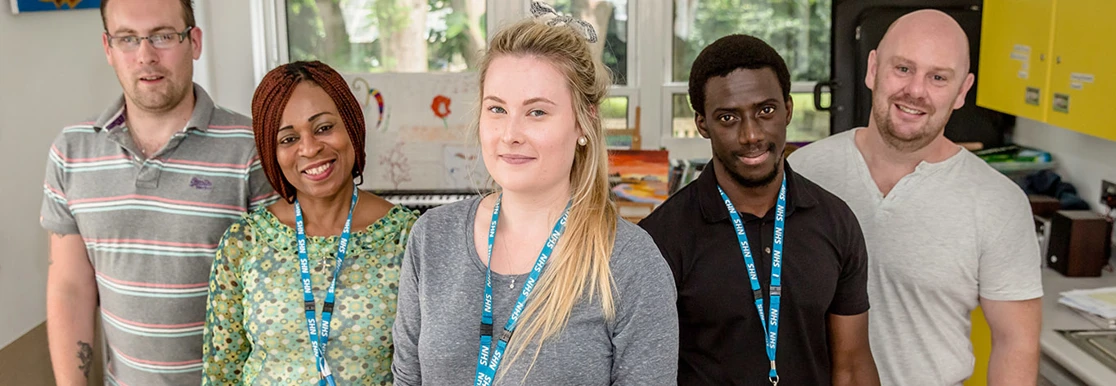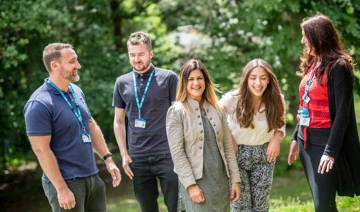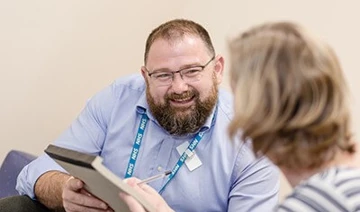Allied Health Professionals
Allied Health Professionals (AHPs) are regulated by the Health and Care Professions Council (HCPC), and include professions such as occupational therapists, speech and language therapists, physiotherapists. art therapists, music therapists and drama therapists. Staff working under the umbrella of an AHP such as assistants and technical instructors, are also included.
Each of the Allied Health Professions has a unique identity and body of expertise. Some of the knowledge-base and core competencies required for practice (such as communication skills, leadership, and professional development) are common to all professions and link closely to evidence-based standards of health care and performance. After nursing, AHPs are the second largest group of staff within the NHS.
For more information about specific professions, please visit the NHS Careers website:
AHPs are based in a variety of clinical areas across the trust. They assess and enable clients to address their health and wellbeing needs.
Julia Wilson is the Trust Strategic Lead for AHPs and is responsible for ensuring effective professional governance, management and leadership for AHPs. The role involves maintaining and developing high quality, innovative practice and services across the trust.
The role supports senior members of staff to recognise the positive, wide ranging and added value that the contribution of AHPs can bring to services within the trust. The role supports and advises on the effective use of AHP knowledge, skill and expertise.
All AHPs are required to be registered with the statutory regulatory body, the Health and Care Professions Council (HCPC).
The HCPC is responsible for protecting patients by maintaining a register of members, setting standards of education and training performance and proficiency, and investigating complaints.
The HCPC publishes the standards of conduct, performance and ethics that registrants must keep to and the standards of proficiency for each professional group.
Details about the standards of proficiency can be found on the HCPC website.
Practice development and support is vital to the development of our staff, their clinical effectiveness, and patient safety and satisfaction.
There are a variety of methods used to aid practice development including:
- peer support
- clinical forums
- personal study
- research.
Practice education or placements are an integral part of the pre-registration education of AHPs.
In most programmes it constitutes approximately half of the duration of the course, (a minimum of 1,000 hours) and is a requirement for registration with the Health and Care Professions Council (HCPC) who regulate the AHP professions.
Experience gained on practice placements ensures that new graduates develop into safe, competent and reflective practitioners. It ensures they are equipped to work in a range of health care settings and are eligible for registration with the HCPC.
We are committed to practice placement education and support the education of student AHPs within the trust. We expect staff to facilitate student placements within their workplace. KMPT offers placements to AHP students from local universities.
Within the South East region there are two main providers of AHP programmes:
- Canterbury Christ Church University (occupational therapy, physiotherapy and speech and language therapy)
- Brighton (occupational therapy and physiotherapy).
We mainly support student placements from these two higher education institutions; however we do consider requests from other universities and will accommodate if able to. We also offer AHP placements to paramedics who require a mental health experience.
Preceptorship provides structured support to newly registered professionals entering at the NHS. It facilitates their development during the first twelve months of their time in post.
We are committed to supporting newly registered staff. Inter-professional action learning sets are provided to support and develop confidence in practice. This takes place through group discussion and structured learning for any newly registered practitioner who is new to the trust and who is undergoing the process of preceptorship.
AHP profession specific packages have been established in line with professional bodies to help practice and consolidate competence and enhance confidence. Preceptorship has been integrated with probation, supervision (professional/clinical), continuing professional development (CPD), and personal training needs.
If you are an AHP who has not practiced for more than two years and wish to return to the profession, you will be expected to meet the requirements of registration with the Health and Care Professions Council (HCPC).
Please contact the HCPC for the requirements of return to practice.
As part of this process you may be asked to complete some practice experience. Please forward any enquires to the AHP practice development/placement coordinator.




